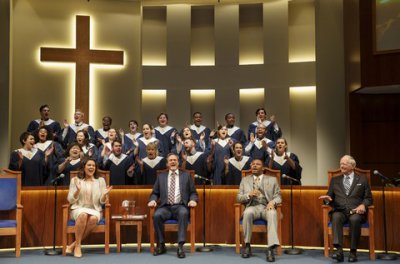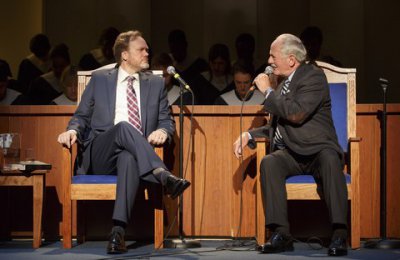The Christians
Lucas Hnath’s sophisticated take on religion asks for your understanding rather than your agreement.
[avatar user=”Daniel J. Lee” size=”96″ align=”left” ] Daniel J. Lee, Critic[/avatar] The Christians, Lucas Hnath’s examination of the intricacies of religion currently playing at Playwrights Horizons, comes to us at a unique cultural moment: every day, scientific advances further challenge the existence of God; ostensibly in an attempt to stay palatable to his mainstream constituents, The Pope has issued a series of proclamations regarding the acceptability of homosexuality, the truth of evolution, and other topics; The Book of Mormon—a patronizing, tongue-in-cheek assessment of the Church of the Latter Day Saints—is still playing to sold-out houses after five years on Broadway. Indeed, the fact that The Christians’ opening line, “Brothers and Sisters, let us pray,” was met with a hearty laugh is telling: today, New York audiences are largely secular and conditioned to sharpen their daggers at the very mention of Christ. To Hnath, however, the subject of religion is no joke.
The Christians explores the consequences resulting from Pastor Paul’s decision to make “a radical change” to his ubiquitously middle American congregation’s deeply rooted ideologies. By challenging the centuries-old beliefs that only Christians go to heaven and that, accordingly, all non-Christians must be missionized and converted, the reverend also challenges his thousands of church members to drastically alter their conceptions of Heaven, Hell and God. A small faction of dissent is lead by Associate Pastor Joshua, who takes approximately fifty worshippers with him to form a new church. As the schism grows to involve the church council of elders, his wife and various concerned worshippers, Pastor Paul is confronted with the possibility of losing his livelihood, family and faith.
The ideas presented in the play—that Christianity contains within it irreconcilable contradictions, that people can be moral without being religious, that it is impossible to prove the presence or absence of something based entirely on faith—are hardly revolutionary. Instead, what shines as new and interesting in Hnath’s play is his refreshingly sincere take on the so frequently mocked subject. Recently, it has been in vogue to sarcastically address the evils of Christianity and denounce it as an institution which has done a certain amount of harm over the years, a criticism which is likely justified. However, Hnath dares to give a voice to the religious zealots, to portray sympathetically characters boldly asserting that any and all people without Christ are condemned to spend eternity in Hell. He suggests that the judgmental Christians we encounter are acting with what they understand to be earnest compassion. He takes the black-and-white absolute Truth of God and pulls out its shades of gray.

Linda Powell, Andrew Garman, Larry Powell and Philip Kerr in a scene from “The Christians” (Photo credit: Joan Marcus)
Equally sincere is the sensitive direction of Les Waters, Artistic Director of Actors Theatre of Louisville where the play was first presented. Staged throughout as a sort of sermon, The Christians’ services take place entirely in scenic designer Dane Laffrey’s pristine mega-church, starkly lit by lighting designer Ben Stanton. The choir of half-emphatic, half-reserved singers flanks Pastor Paul and his associates who look out at us, the captivated congregation. Waters does well to balance the play’s inherently presentational, (for want of a better term) preachy aspects with its undercurrent of genuine compassion; the moments of religious rhetoric are big and commanding and the moments of heartfelt human interaction are appropriately intimate.
Further accentuating the simultaneously grand and personal tone of the piece is the passionate cast. Andrew Garman leads the congregation as the charismatic Pastor Paul, employing his strong oratory skills as well as a healthy dose of Logos to convince us of his less than traditional religious perspective. Larry Powell’s Associate Pastor Joshua is equally charismatic, but bearing a fiery intensity in his eyes and an irresistible appeal to our emotions. Perhaps more compelling, however, is Linda Powell, who imbues Pastor Paul’s conflicted wife Jenny with enough passion to win over even the most fervent atheists. Rounding out the small cast is the stalwart Phillip Kerr as elders’ council member Jay and the wounded Emily Donahoe as disgruntled church member Elizabeth.
Conversion is emphatically neither the goal nor the result of The Christians; rather, it succeeds at getting its audience members to sheathe momentarily their daggers and engage critically with the topic of religion. Hnath initiates a new type of dialogue about faith, a dialogue free of sarcasm, condescension and judgment. He advocates for understanding rather than agreement, for plurality rather than consensus. Devout Christians and staunch non-believers alike often field challenges to their belief systems, and perhaps both camps deserve many of the criticisms they receive; however, they also deserve respect. Indeed, The Christians is no laughing matter.
The Christians (through October 25, 2015)
Playwrights Horizons
416 West 42nd Street, in Manhattan
For tickets, call 212-279-4200 or visit http://www.playwrightshorizons.org
Running time: 100 minutes with no intermission







This review demonstrates incredible understanding of this play. Well written too! I felt optimism as I read it.